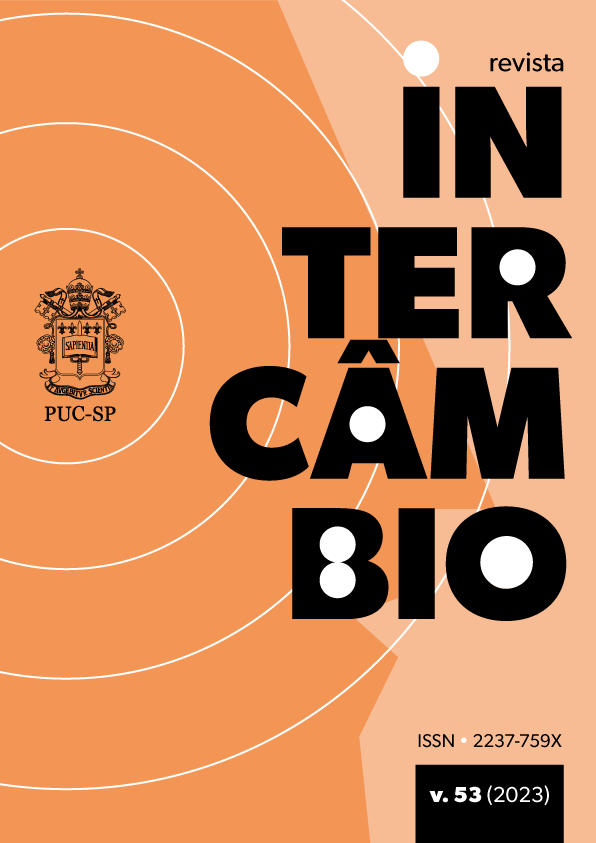O Disfemismo no discurso político do editorial
um enfoque da linguística sistêmico-funcional
DOI:
https://doi.org/10.23925/2237-759X2023V53e62941Palavras-chave:
Editorial, Disfemismo, Persuasão, Avaliatividade, Metáfora e metonímia conceituaisResumo
Editoriais de jornal usam palavras como armas para exercer controle ideológico, tentando persuadir a audiência a acreditar em suas propostas. Este estudo, apoiado na noção de avaliatividade e da relação metonímia-metáfora, examina a contribuição do disfemismo na crítica à trajetória do governo do presidente Bolsonaro. Para tanto, responde às perguntas: (a) Qual é a contribuição da avaliatividade na análise do disfemismo no discurso político? (b) Que papel exerce a relação metáfora-metonímia na persuasão por meio do disfemismo? Os resultados comprovam a força do disfemismo no apoio à proposta do editorial em provar a incapacidade de Bolsonaro como presidente da República.
Referências
ALLAN, K.; BURRIDGE, K. Euphemism and Dysphemism: language used as shield and weapon. New York: Oxford University Press, 1991.
ALLAN, K.; BURRIDGE, K. Forbiden words: taboo and the censoring of language. New York: Cambridge University Press, 2006.
BARCELONA, A. The cognitive theory of metaphor and metonymy. In: BARCELONA A. (ed.)., Metaphor and metonymy at the crossroads: a cognitive perspective. Berlin: Mouton de Gruyter, p. 1-28, 2000a.
BARCELONA, A. On the plausibility of claiming a metonymic motivation for conceptual metaphor. In: Barcelona A. (ed.)., Metaphor and metonymy at the crossroads: a cognitive perspective. Topics in English linguistics. Berlin: Mouton de Gruyter, p. 31-58, 2000b.
BROWN, P.; LEVINSON, S. C. Politeness: some universals in language usage. Cambridge: Cambridge University Press, 1987.
CARVER, T.; PIKALO, J. Political Language and Metaphor: Interpreting and Changing the world. In: Routledge innovations in Political Theory., London, Routledge, 2008.
CHARTERIS-BLACK, J. Corpus approaches to critical metaphor analysis. New York: Palgrave Macmillan, 2004.
CHARTERIS-BLACK, J. Politicians and rhetoric – the persuasive power of metaphor. New York: Palgrave Macmillan, 2005.
CHILTON, P. Analysing political discourse:theory and practice. London: Routledge, 2004.
CRESPO-FERNÁNDEZ, E. El eufemismo y el disfemismo:procesos de manipulación del tabú en el lenguaje literário inglés. Alicante: Publicaciones de la Universidad de Alicante, 2007.
CRESPO-FERNÁNDEZ, E. Words as weapons for mass persuasion: dysphemism in Churchill’s wartime speeches. Text & Talk, 33.3: 311-330, 2013.
CROFT, W. The role of domains in the interpretation of metaphors and metonymies. Cognitive linguistics, 4: 335-370, 1993.
DIRVEN, R. Metonymy and metaphor: different mental strategies of conceptualisation. Leuvense bijdragen, 82: 1-28, 1993.
FORCEVILLE, C. Non-verbal and multimodal metaphor in a cognitivist framework: agendas for research., In: FORCEVILLE, C.; URISO-APARISI, E. (ed.). Multimodal Metaphor, Berlin: De Gruyter, 2009.
GEERAERTS, D. The interaction of metaphor and metonymy in composite expressions. In: DIRVEN, R.; PÖRINGS, R. (ed.). Metaphor and metonymy in comparison and contrast. Berlin: Mouton de Gruyter, 2003.
GOFFMAN, E. Interaction ritual: essays on face-to-face behavior. New York: Pantheon Books, 1967 [1955].
HAKAM, J. The 'cartoon controversy': a critical discourse analysis of English-language Arab newspaper discourse. Discourse & Society, 33-57, 2009.
HALLIDAY, M. A. K. Introduction to Functional Grammar.Londres: Edward Arnold, 1994.
HALLIDAY, M. A. K.; MATTHIESSEN, C. M. I. An introduction to Functional grammar. London: Arnald, 2004.
KITIS, E.; MILAPIDES, M. Read it and believe it: how metaphor constructs ideology in news discourse, a case study. Journal of Pragmatics, 28: 557-590, 1997.
LAKOFF, G. The contemporary theory of metaphor. In: ORTONY, Andrew (ed.) Metaphor and Thought. Cambridge: Cambridge University Press, 202-251, 1993.
LAKOFF, G.; JOHNSON, M. Metaphors we live by. Chicago: The University of Chicago Press, 1980.
LAKOFF, G.; TURNER, M. More than cool reason: a field guide to poetic metaphor. Chicago: The University of Chicago Press, 1989.
LEMKE, Jay L. Resources for attitudinal meaning – evaluative orientations in text semantics. Functions of Language, 5,1. 33-56, 1998.
LI, J. Transitivity and lexical cohesion: press representations of a political disaster and its actors. Journal of Pragmatics, 42.12: 3444-3458, 2010.
MARTIN, J. R. Language, register and genre. In: CHRISTIE F. (org.). Language studies: children´s writing: reader. Geelong: Deakin University Press, 1984.
MARTIN, J. R. The English text – System and structure: Amsterdã: John Benjamins, 1992.
MARTIN, J. R. Beyond exchange: Appraisal Systems in English. In:
HUNSTON, S.; THOMPSON, G. (org.). Evaluation in text: authorial stance and the construction of discourse. Oxford: University Press, 2000.
MARTIN, J. R. Introduction. In: MACKEN-HORARIK, M.; MARTIN, J.R. (org.). Text and Talk, 23.2: 171-181, 2003.
MARTIN, J. R.; WHITE, P. R. R. The language of evaluation: Appraisal in English. Londres: Palgrave Macmillan, 2005.
MUSOLFF, A. Metaphor and political discourse: analogical reasoning in debates about Europe. London: Palgrave Macmillan, 2004.
MUSOLFF, A. Metaphor, Nation an the Holocaust: The concept of the body politic. London: Routledge, 2010.
PANTHER, K.; RADDEN, G. Metonymy in language and thought. Amsterdam: John Benjamins, 1999.
PARTINGTON, A. The linguistics of political argument: the spin-doctor and the wolf-pack at the White House. London, England: Routledge, 2003.
RADDEN, G. How metonymic are metaphors? In: BARCELONA, A. (ed.). Metaphor and metonymy at the crossroads. Berlin: Mouton de Gruyter, 2000.
RUIZ DE MENDOZA IBÁÑEZ, F. J. The role of mappings and domains in understanding metonymy. In: BARCELONA, A. (ed.). Metaphor and metonymy at the crossroads. Berlin: Mouton de Gruyter, 2000.
SCHÄFFNER, C. Metaphor and interdisciplinary analysis. Journal of Area Studies, 11: 57–72, 1997a.
SCHÄFFNER, C. Translation Studies. In: VERSCHUEREN, J.; ÖSTMAN, J.-O., BLOMMAERT, J., BULCAE, C. (ed.). Handbook of Pragmatics. Amsterdã: John Benjamins, 1–17, 1997b.
TAYLOR, J. R. Linguistic Categorization: Prototypes in Linguistic Theory. Oxford: Clarendon Press, 1995. [1989]
THOMPSON, G.; THETELA, P. The sound of one hand clapping: the management of interaction in written discourse. Text & Talk, 15.1: 103-128, 1995.
VAN DIJK, T. A. Elite discourse and racism. Newbury Park, CA: Sage, 1993.
VAN DIJK, T. A. Discourse as social interaction. Spain: Pompeu Fabra University, 1997.
VELASCO-SACRISTÁN, M. Metonymic grounding of ideological metaphor: evidence from advertising gender metaphor. Journal of Pragmatics, 42: 64-96, 2010.
WHITE, P. R. R. Beyond modality and hedging: a dialogic view of the language of intersubjective stance. In: Text, 23.2, 259-284, 2003.
Downloads
Publicado
Como Citar
Edição
Seção
Licença
Copyright (c) 2023 Sumiko Nishitani Ikeda, Adriana Baldas Kutz Bertelli

Este trabalho está licenciado sob uma licença Creative Commons Attribution 4.0 International License.






